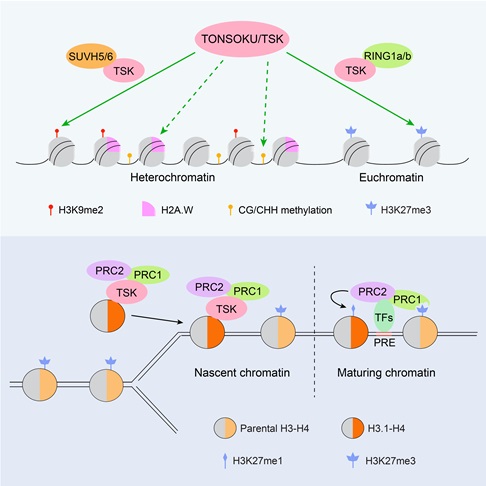The status of chromatin, influenced by chromatin modifications, contribute to the epigenetic control of the eukaryotic genome functions. Thus, the stability of eukaryotic genomes relies on the faithful transmission of both genetic and epigenetic information through DNA replication. However, chromatin re-assembly after DNA replication presents a challenge as it involves the recycling of modified parental histones and the incorporation of predominantly unmodified new histones. This process can result in the dilution of chromatin modifications that are crucial epigenetic marks, necessitating their restoration after replication.
Plant TONSOKU (TSK) and its animal orthologue TONSOKU-like (TONSL) have been identified as key players involved in preserving DNA integrity by acting as readers for newly synthesized histones and facilitating DNA repair at post-replicative chromatin. Mutations in TONSL have been associated with human diseases. However, whether TSK/TONSL is involved in epigenetic inheritance remains unclear.
A recent study conducted by a team led by Dr. JIANG Danhua from the Institute of Genetics and Developmental Biology (IGDB) of the Chinese Academy of Sciences shed light on this matter. The study demonstrated that TSK plays a vital role in maintaining several repressive chromatin modifications in the model plant Arabidopsis thaliana, thereby unveiling a novel function of TSK in assisting epigenetic inheritance.
In this study, they found that TSK is dispensable for global histone and nucleosome accumulation but necessary for maintaining repressive chromatin modifications including H3K9me2, H2A.W, H3K27me3 and DNA methylation.
Further analyses revealed that tsk mutation strongly enhances defects in the Polycomb mutants, suggesting their coordination in maintaining H3K27me3 and Polycomb silencing. In addition, TSK physically associates with the H3K9 methyltransferases SUVH5 and SUVH6, as well as Polycomb proteins RING1a and RING1b, implying that TSK may recruit them to nascent chromatin to restore chromatin modifications.
These results suggest that TSK ensures the maintenance of chromatin modifications by facilitating the recruitment of chromatin modifiers during a critical time frame when TSK is shortly loaded onto the nascent chromatin.
In summary, the findings of this study reveal that TSK has a dual role in regulating both DNA repair and epigenetic stability. These findings underscore the importance of further investigating the function of TONSL and the pathogenesis of diseases associated with TONSL mutations.
This work entitled " TONSOKU is required for the maintenance of repressive chromatin modifications in Arabidopsis " was published in Cell Reports on July 1, 2023 (https://doi.org/10.1016/j.celrep.2023.112738).
This study was funded by the National Natural Science Foundation of China and the National Key R&D Program of China.
TSK assists in the maintenance of repressive chromatin modifications and may directly recruit chromatin modifiers onto the nascent chromatin (Image by IGDB)
Contact:
Dr. JIANG Danhua
Institute of Genetics and Developmental Biology, Chinese Academy of Sciences
 TSK assists in the maintenance of repressive chromatin modifications and may directly recruit chromatin modifiers onto the nascent chromatin (Image by IGDB)Contact:Dr. JIANG DanhuaInstitute of Genetics and Developmental Biology, Chinese Academy of SciencesEmail: dhjiang@genetics.ac.cn
TSK assists in the maintenance of repressive chromatin modifications and may directly recruit chromatin modifiers onto the nascent chromatin (Image by IGDB)Contact:Dr. JIANG DanhuaInstitute of Genetics and Developmental Biology, Chinese Academy of SciencesEmail: dhjiang@genetics.ac.cn CAS
CAS
 中文
中文




.png)
